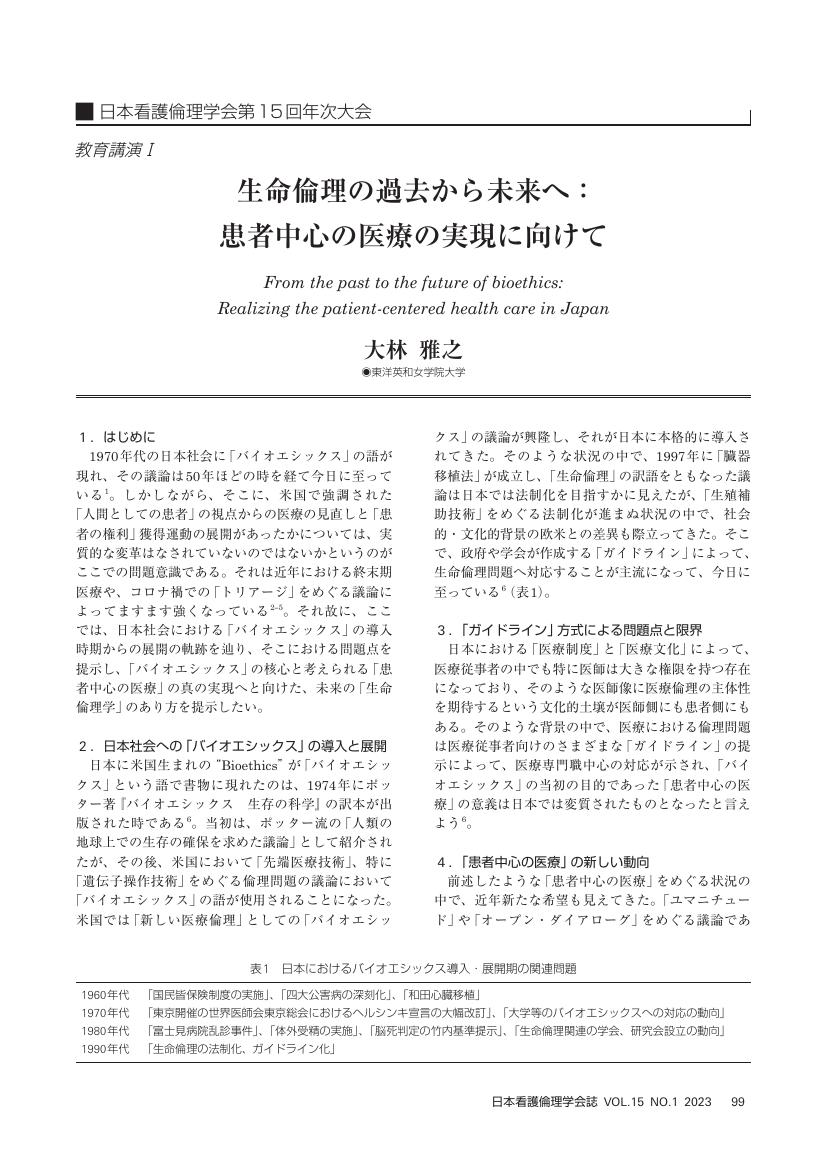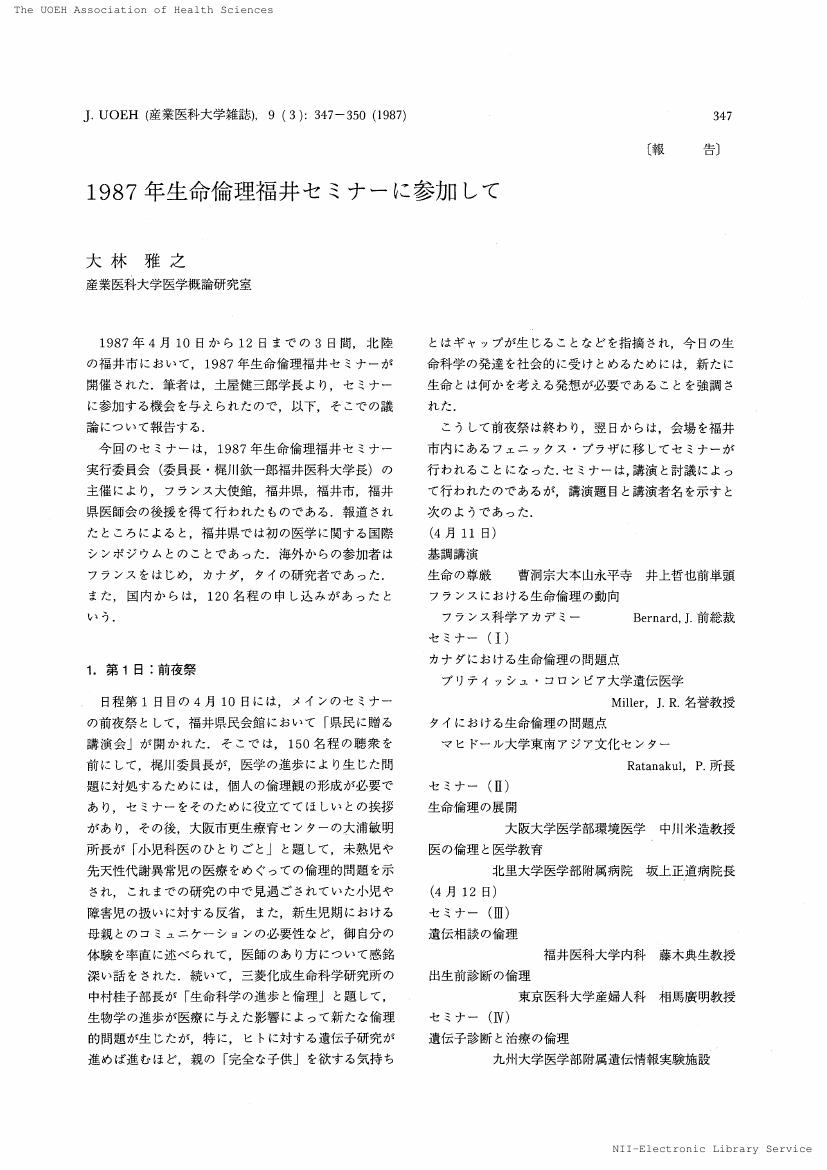5 0 0 0 OA ニールス・ボーアの相補性原理と生命観
- 著者
- 大林 雅之
- 出版者
- 科学基礎論学会
- 雑誌
- 科学基礎論研究 (ISSN:00227668)
- 巻号頁・発行日
- vol.17, no.2, pp.97-103, 1985-03-30 (Released:2009-07-23)
- 参考文献数
- 28
3 0 0 0 OA 生命倫理の過去から未来へ:患者中心の医療の実現に向けて
- 著者
- 大林 雅之
- 出版者
- 日本看護倫理学会
- 雑誌
- 日本看護倫理学会誌 (ISSN:24347361)
- 巻号頁・発行日
- vol.15, no.1, pp.99-100, 2023-03-20 (Released:2023-04-14)
- 参考文献数
- 10
2 0 0 0 OA 「小さな死」と「孤独」
In this paper I will clarify the relationship between the meaning of “Solitude” as a way of life, and the meaning of “Little Deaths” which were discussed by Kazuko Watanabe, a Catholic sister. Watanabe defined “Solitude” as the original way of human existence, and as a positive concept. She showed that “Little Deaths” were experienced when living with a consciousness of death, and when living honestly. Furthermore, living honestly means facing oneself and living honestly in “Solitude,” which is seen as the original way of life for human beings. In other words, she seemed to say that the original way of human existence is to accumulate experiences of “Little Deaths” through “Solitude” and honesty.
2 0 0 0 OA 1987年生命倫理福井セミナーに参加して
- 著者
- 大林 雅之
- 出版者
- 学校法人 産業医科大学
- 雑誌
- Journal of UOEH (ISSN:0387821X)
- 巻号頁・発行日
- vol.9, no.3, pp.347-350, 1987-09-01 (Released:2017-04-11)
1 0 0 0 OA 生命倫理学と医学哲学の間 — 「医学の哲学」から「医療の哲学」へ —
- 著者
- 大林 雅之
- 出版者
- 九州医学哲学・倫理学会
- 雑誌
- 人間と医療 (ISSN:21863482)
- 巻号頁・発行日
- vol.12, pp.42-50, 2022 (Released:2023-02-17)
1 0 0 0 OA 遺伝子治療における「遺伝子」の意味と倫理的問題
- 著者
- 大林 雅之
- 出版者
- 日本医学哲学・倫理学会
- 雑誌
- 医学哲学 医学倫理 (ISSN:02896427)
- 巻号頁・発行日
- vol.10, pp.71-79, 1992-10-23 (Released:2018-02-01)
The study of genes, with the development of molecular biology, raises ethical issues in the basic and applied life sciences, including biotechnology and biomedical sciences. The ethical issues are connected with recombinant DNA experiments, the Human Genome Project, experiments on organisms with recombinant DNA in the field, gene diagnosis, gene therapy, etc. In this papar, I am particularly concerned with the structure of ethical problems in gene therapy and I consider it in terms of the biological meanings of genes. Ethical problems in the study of genes at the molecular level have occurred today because we can manipulate genes directly. However, when we know the biological meanings of genes, it is not easy for us to manipulate genes from the ethical point of view. The gene has three meanings: (1) It is the product of evolution, (2) It is what creates the identity of each human being, (3) It is the source of the continuity of the human species. Therefore, gene manipulation is connected with individual problems, the relations among generations, the problems between human beings and the ecosystem, and the whole world of organisms. When we consider the ethical problems in human gene therapy in terms of the three meanings of genes, we can see new problems concernings gene therapy as follows: Can we avoid the problems which appear among generations even if we can practice gene therapy not with somatic cells but with germline cells, given meanings (1) and (3) ? Moreover, will gene therapy exacerbate problems connected with the evaluation of genetic information for each person in terms of eugenics, given meaning (2) ?
- 著者
- 大林 雅之
- 出版者
- 日本医学哲学・倫理学会
- 雑誌
- 医学哲学 医学倫理 (ISSN:02896427)
- 巻号頁・発行日
- vol.8, pp.65-78, 1990-07-31 (Released:2018-02-01)
From the late 1960s, arguments concerning ethical problems in clinical applications and experiments of life sciences and biomedical sciences began in the United States. They caused the birth of a new discipline, bioethics. This situation influenced American medical education and showed various difficulties in the traditional ways of training physicians in professional ethics. American medical schools had to make new educational programs, that is, medical humanities, whereby students would have special courses in human values. The purpose of this paper is to consider historically the connection between the bioethics movement and the development of humanistic medical education in the United States and to make clear the influence of bioethical ideas in medical humanities. The author concludes that the medical humanities program is based on the ideas of bioethics. One of these is that a patient's autonomy has to be respected in medicine. Another is that we must participate in interdisciplinary discussions in order to make correct decisions in ethical problems of life sciences and medicine. The necessity of humanistic medical education in Japanese medical schools is also discussed.
1 0 0 0 OA シュレーディンガーの生命観 : 『生命とは何か』をめぐって
- 著者
- 大林 雅之
- 出版者
- 日本医学哲学・倫理学会
- 雑誌
- 医学哲学 医学倫理 (ISSN:02896427)
- 巻号頁・発行日
- vol.6, pp.41-51, 1988-07-31 (Released:2018-02-01)
1 0 0 0 OA 医療における哲学の役割 Bioethicsをめぐって
- 著者
- 大林 雅之
- 出版者
- 日本科学哲学会
- 雑誌
- 科学哲学 (ISSN:02893428)
- 巻号頁・発行日
- vol.32, no.2, pp.15-23, 1999-11-10 (Released:2009-05-29)
- 被引用文献数
- 1
以上の議論から,小論における一応の結論を以下のように示すことができよう.「医学の哲学」は従来から議論されていたが,1960年代から起こったバイオエシックスの議論が,従来の「医学の哲学」を,患者(「非専門家」)の役割を考慮することにより,医療のリアリティーに迫るものに変えた.医療者と患者により成立する「医療」についての哲学こそ「医学の哲学」すなわち「医療の哲学」なのである.



